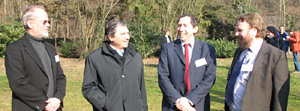 |
|||||||||||
|
|||||||||||
|
|||||||||||
|
Last week, the future of particle physics in Europe was debated in Orsay (near Paris, France) from 30 January to 1 February. An Open Symposium, organised by the CERN Council Strategy Group, gathered more than 400 scientists from all over Europe, as well as representatives from North America and Asia. With the help of an interactive webcast, 70 scientists participated remotely. A lively discussion took place which will provide input for the final strategy to be selected by July. Before this meeting, each country was invited to submit its roadmap. Suggestions from organisation representatives and from groups of scientists or individual physicists were also welcomed. "They have been asked what their priorities were.", said Ken Peach, co-chair of the Strategy Group and Chair of the CERN Scientific Policy Committee. "This open symposium has been created to give the opportunity to physicists to intervene and share their opinions. We were convinced that half of our time should be spent in discussions." The CERN Council is the governing body of CERN in which the representatives of the 20 Member States decide on scientific programmes and financial resources. Following the vision of CERN's founding convention, the CERN Council was charged with establishing a unified strategy for particle physics. "Physics will drive our decision process.", said Enzo Iarocci, President of CERN Council. Despite tremendous discoveries in the last century, physicists' representation of nature is not yet complete. New physical processes are like a jigsaw puzzle, where one needs all the pieces to completely understand burning questions like the origin of mass of particles, the unification of forces or the nature of dark matter and dark energy. Solving these mysteries is why particle physicists work on different types of experiments such as hadron and electron colliders and neutrino and flavour physics. During the three day Symposium, all attendees assiduously followed each session, demonstrating their interest in all these activities. Participants discussed theoretical research, R&D in accelerator and detector technology at the high energy, and high precision frontiers. The articulation between the exciting future Large Hadron Collider project and the major experiments to come was the subject of lively debate. The interface between fundamental physics, astroparticle and nuclear physics was also on the agenda. Prioritization will be challenging for the Strategy Group. They will have to understand the physics case of each proposal, their relevance to reveal new physics and also budget matters. "On these prioritisations, members of the scientific community have definite but different answers.", said Iarocci. "The Symposium gave a comprehensive review of the field and the level of contributions was astonishingly high.", said Torsten Åkesson, co-chair of the Strategy Group and Chair of European Committee for Future Accelerators (ECFA) . The last workshop for the strategy group will be held at Zeuthen (outside Berlin, Germany) in May. Contributions received by 15 March 2006 will be reviewed and will serve as a working material. "We will make sure to have heard everyone's opinion.", Åkesson said. A unanimous approval is expected for a strategy document addressing the main lines of particle physics in Europe. It will be presented to European governments at the CERN Council meeting, which will take place in Lisbon, Portugal next July. Conference slides: CERN Council Strategy Group website: http://events.lal.in2p3.fr/conferences/Symposium06/Gallery/index.html -- Perrine Royole-Degieux |
|||||||||||
| © International Linear Collider |
